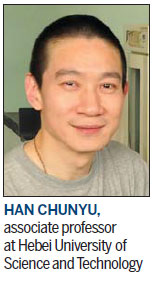Scientist defends genetics discovery

Some geneticists report trouble replicating new gene-editing technique
The journal Nature Biotechnology said on Aug 2 that it would investigate criticisms of what was thought to be a breakthrough gene-editing technique developed by Chinese scientist Han Chunyu.
Han's paper describing his research findings on a new gene-editing technology called NgAgo was published online in early May by Nature Biotechnology, a monthly scientific journal of Nature Publishing Group. It drew international attention.
Just three months later, some peer scientists began to question the research's viability, largely because they have not been able to replicate the results so far.
On July 29, Gaetan Burgio, who heads the transgenesis lab at Australian National University, wrote on Twitter that he had found no evidence for genome editing using NgAgo after multiple attempts.
Han's paper contradicted the conditions needed for a successful replication, Burgio said. In a previous statement, he had said the NgAgo technique was efficient in editing gene fragments of mice.
The journal said it had been contacted by several researchers who said they had not been able to reproduce Han's published results. The journal said it takes any concerns raised about any paper seriously and considers them carefully, and it is now following an established process to investigate the issues.
Han, 42, an associate professor at Hebei University of Science and Technology, has vowed to repeat the experimental results.

Responding to requests that he disclose the original experimental data, he says he would do that upon the journal's request. Nature Biotechnology has not made such a request so far.
"It's like they have ganged up against NgAgo," Chinese media quoted Han as saying.
The new technology had been touted as being better than the current mainstream gene-editing technique, CRISPR/Cas9, in precision, efficiency and flexibility, and that it helps solve the "off-target effect" problem, a major issue with CRISPR/Cas9 in which useful parts of genomes are sometimes removed while editing targeted parts. The NgAgo method is theoretically thousands of times more accurate, according to some media reports.
Yet the issue is about more than just the science; the method has a potentially huge business impact, especially for companies already heavily invested in the CRISPR technology, according to an opinion published by Qilu Net, a Chinese news portal.
NgAgo is a possible replacement for CRISPR once it is widely confirmed, and that inevitably undermines colossal business interests and investments based on CRISPR, the portal said.
The primary developers of CRISPR/Cas9 have gone on to establish their own companies and commercialize the technology.
Also in May, Caribou Biosciences, which was co-founded by CRISPR/Cas9 co-developer Jennifer Doudna, announced the completion of a $30 million Series B financing round.
At the same time, Editas Medicine, founded by Zhang Feng of the Massachusetts Institute of Technology along with Doudna and other scientists, announced a three-year, $5 million agreement with the nonprofit Cystic Fibrosis Foundation Therapeutics.
A Beijing-based researcher who did not want to be named told China Daily on Aug 1 that it is too early to cast doubt on Han's research findings or to jump to conclusions.
"That Han's experimental results cannot be replicated so far doesn't mean it cannot be in the future," the researcher says. "The issue should be left to time and peer scientists. Give it at least three to five years."
shanjuan@chinadaily.com.cn
(China Daily Africa Weekly 08/05/2016 page19)
Today's Top News
- Foreign ministers of China, Egypt call for Gaza progress
- Shield machine achieves Yangtze tunnel milestone
- Expanding domestic demand a strategic move to sustain high-quality development
- Xi hears report from Macao SAR chief executive
- Xi hears report from HKSAR chief executive
- UN envoy calls on Japan to retract Taiwan comments






























